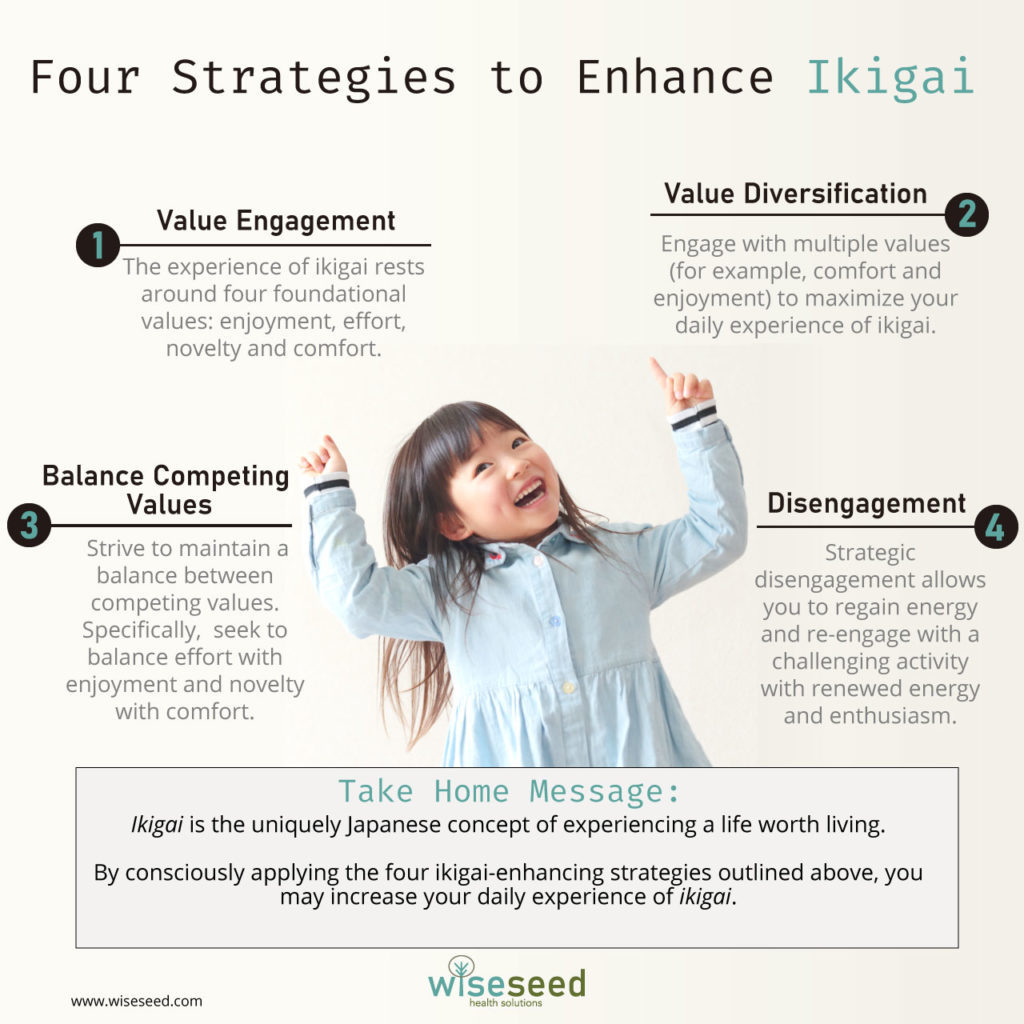Four Strategies to Enhance Ikigai

十人十色
The focus of this article is ikigai, the uniquely Japanese concept of a life worth living. Ikigai is particularly relevant if you want to experience more meaning throughout your day-to-day life.
What is ikigai?
One of the pioneering researchers of ikigai was Dr. Kamiya (1). During the 1950s, while Dr. Kamiya was working with leprosy patients, she discovered that some patients retained feelings of hope and joy in their lives despite suffering from a devastating disease. (1). It was by observing these patients that Dr. Kamiya developed a deep understanding of ikigai (1).
Dr. Kamaiya realized that ikigai differs from happiness in several unique ways (1).
First, ikigai is future-orientated, so that if you are struggling with your current situation, you can still experience ikigai in the form of future hopes or goals (1).
Second, experiencing ikigai is closely related to your sense of self, and performing tasks that you are exceptionally skilled at or passionate about increases your sense of ikigai (1).
Third, you experience ikigai when you perform tasks that closely align with your core values (1).
Fourth, ikigai is often most strongly experienced by people who have suffered loss, as Dr. Kimaya’s leprosy patients certainly had (1).
Finally, ikigai is not a formal, intellectual philosophy. Instead, it would help if you approached ikigai as a gentle, everyday practice that enhances your meaning in life (1).
Four Ways to Increase Ikigai in Your Life
Ikigai provides a practical framework for you to experience meaning in your daily life. Furthermore, ikigai may be especially helpful if you feel isolated or have experienced loss.
The question is, how do you increase the amount of ikigai in your daily life?
Fortunately, Drs. Kono and Walker analyzed how Japanese university students pursue ikigai in their day-to-day lives (2). As a result, their research has uncovered four simple principles that may help you increase your daily experience of ikigai.
1. Value Engagement
The study’s most important finding was that the experience of ikigai rests around four foundational values (2).
- Enjoyment (tanoshimi) Students engage in activities that they find intrinsically enjoyable, such as socializing with friends.
- Effort (ganbari) Students enjoy engaging in challenging activities, resulting in setbacks, frustration, and stress. However, persisting in the face of adversity provides students with long-term rewards in the form of accomplishments and self-enhancement.
- Stimulation (shigeki) For university students, stimulation means novelty: new people, places, and ideas. Novelty helps keep the student’s everyday life fresh and exciting. Further, exposure to novelty can lead to a radical transformation of a student’s ideas and value systems. Thus, stimulation provides an essential source of personal growth.
- Comfort (iyashi) Students find comfort in routine and thus seek out familiar places and socialize with close friends. In comfortable environments, students can express their true selves free from judgment.
2. Value Diversification
Students engage with multiple values (for example, comfort and enjoyment) to maximize their experience of ikigai (2). There are two ways students engage multiple values.
First, they perform two or more different activities, each with distinct values. For example, students study hard (effort) and then enjoying a social outing with friends (enjoyment) (2).
In addition, students can participate in activities that engage multiple values simultaneously, such as playing a competitive sport that they enjoy and requires effort to play (2).
3. Balance Competing Values
Whenever possible, students strive to maintain a balance between competing values. Specifically, students generally seek to balance effort with enjoyment and stimulation with comfort (2).
4. Value Disengagement
When students engage with an experience for a long time, particularly experiences that require significant effort, they feel overwhelmed and risk burning out. During these times of stress, students often disengage and take a breather (2). Strategic disengagement allows students to regain energy and re-engage with the challenging activity with renewed energy and enthusiasm.
Take-Home Message
To experience meaning throughout your daily life is the essence of ikigai. It is not a grand intellectual philosophy. Instead, ikigai is a gentle, organic practice that enhances your ability to experience meaning throughout your day.
By consciously applying the four ikigai-enhancing strategies outlined above, you may increase your daily experience of ikigai. Hopefully, these practices can help you realize that your life is indeed worth living.

References and Further Reading
1. M. Kamiya, Ikigai-ni-tsuite [On 755 ikigai]. Tokyo, Japan: MisuzuShyobou, (1966).
2. S. Kono, G. J. Walker, Theorizing ikigai or life worth living among Japanese university students: A mixed-methods approach. Journal of Happiness Studies 21, 327-355 (2020).
Acknowledgments
Images created by Tirachard and ayaka_photo
Disclaimer
The material displayed on this website is provided without any guarantees, conditions or warranties as to its accuracy.
Information written and expressed on this website is for education purposes and interest only. It is not intended to replace advice from your medical or healthcare professional.
You are encouraged to make your own health care choices based on your own research and in conjunction with your qualified practitioner.
The information provided on this website is not intended to provide a diagnosis, treatment or cure for any diseases. You should seek medical attention before undertaking any diet, exercise, other health program or other procedure described on this website.
To the fullest extent permitted by law we hereby expressly exclude all warranties and other terms which might otherwise be implied by statute, common law or the law of equity and must not be liable for any damages whatsoever, including but without limitation to any direct, indirect, special, consequential, punitive or incidental damages, or damages for loss of use, profits, data or other intangibles, damage to goodwill or reputation, injury or death, or the cost of procurement of substitute goods and services, arising out of or related to the use, inability to use, performance or failures of this website or any linked sites and any materials or information posted on those sites, irrespective of whether such damages were foreseeable or arise in contract, tort, equity, restitution, by statute, at common law or otherwise.

Ten Minutes is All You Need
Research has shown that ten minutes of moderate-to-vigorous exercise performed each day is enough to significantly reduce your risk of early death.

The Female Hero
Both men and women have a proven capacity to be heroic. However in many circumstances, even those that incur a high risk of torture and death, there are often more heroic women than men.




